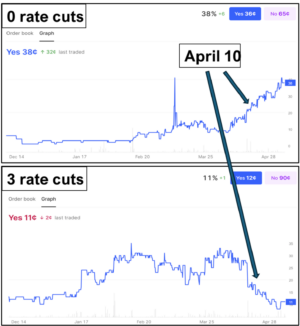America rarely has been so politically divided, and the stock market has rarely been happier.
Despite a horribly divisive election—and contested results—the Dow Jones Industrial Average is within striking distance of passing 30,000. If the milestone is achieved, it would let the world know that America’s economy is still one of the most powerful in the world, even if our political house is behaving like a banana republic.
The options market, which always casts a skeptical eye on the passing scene, is pricing the stock market as if the main barometer of equities, the S&P 500 index, will move up or down about 1.3% each and every day.
This elevated implied volatility can be a powerful tool for investors to better navigate the market in the aftermath of our bizarre presidential election.
The Republican incumbent, Donald Trump, alleges voter fraud without citing evidence. His administration is refusing to work with President-elect Joe Biden to peacefully transfer power. The financial pundits are palavering about what it all means, and value stocks are now coming into favor after a long exile. But, as with political polls, not everything is as it seems.
You won’t read about this in bank research or strategy notes, but the value-stock surge might be driven by a rarely discussed seasonal factor. Many financial firms and banks end their fiscal years before Dec. 31. Consequently, bank employees get more conservative about investment risks because they don’t want to risk their annual bonuses.
What do they do? They sell their winners, which tend to be growth stocks, and buy the sinners, which you know as value stocks. The shift is more dramatic and noticeable this year because technology stocks have widely outperformed the broad market, while value stocks—the battered underperformers—have lagged behind.
Potential vaccines and treatments for Covid-19 could also be leading investors to favor downtrodden stocks that would be set to skyrocket when the economy reopens. But it is hard to discount the influence of the annual sentiment shift on the Street.
In these strange days, it helps to be comfortable being uncomfortable. Aggressive investors can try harnessing the iShares Russell 2000 exchange-traded fund (ticker: IWM) in anticipation that the ETF—which holds value-focused small-cap stocks and has trailed the SPDR S&P 500 ETF (SPY) for a decade—will have its moment in the sun for at least another month.
With the Russell ETF trading around $173, sell the December $171 put option and buy the December $174 call option for a credit of about 32 cents.
If the thesis is wrong and the ETF declines, cover the put at the higher price and move on. If it keeps rallying, the trade will prove profitable. At $180, the call is worth $4. During the past 52 weeks, the ETF has ranged from $95.69 to $178.10.
This approach seeks to profit from forces shaping the markets without making a major commitment, especially as investors are likely to soon focus on the runoff elections for Georgia’s two Senate seats, and thus once more seek safety in tech stocks, which were equity hideouts during the worst of the Covid-19 pandemic.
For now, investors are taking profits on Apple (AAPL), Amazon.com (AMZN), Netflix (NFLX), and Facebook (FB), but the surreal present moment should not overshadow the broader, more powerful themes.
No one will ever refer to this time as the Age of Value Stocks. The tech titans will probably return to favor early next year as the Street embraces risk and greed once more—and as it becomes clear that Washington may not be as legislatively gridlocked as expected.
The big tech names may once more become the favored place to hide out until the storm passes.
—
Originally Posted on November 12, 2020 – How to Play the Value-Stock Boomlet—While It Lasts
Disclosure: Interactive Brokers
Information posted on IBKR Campus that is provided by third-parties does NOT constitute a recommendation that you should contract for the services of that third party. Third-party participants who contribute to IBKR Campus are independent of Interactive Brokers and Interactive Brokers does not make any representations or warranties concerning the services offered, their past or future performance, or the accuracy of the information provided by the third party. Past performance is no guarantee of future results.
This material is from Barron's and is being posted with its permission. The views expressed in this material are solely those of the author and/or Barron's and Interactive Brokers is not endorsing or recommending any investment or trading discussed in the material. This material is not and should not be construed as an offer to buy or sell any security. It should not be construed as research or investment advice or a recommendation to buy, sell or hold any security or commodity. This material does not and is not intended to take into account the particular financial conditions, investment objectives or requirements of individual customers. Before acting on this material, you should consider whether it is suitable for your particular circumstances and, as necessary, seek professional advice.
Disclosure: Options Trading
Options involve risk and are not suitable for all investors. Multiple leg strategies, including spreads, will incur multiple commission charges. For more information read the "Characteristics and Risks of Standardized Options" also known as the options disclosure document (ODD) or visit ibkr.com/occ

























